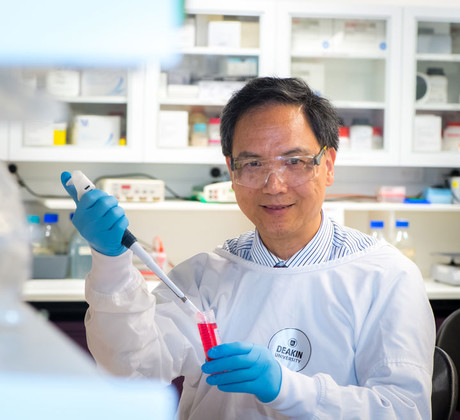Deakin University and Chinese biotech company set up lab to develop cancer-detecting blood test

Deakin University and a Chinese biotech company have partnered to develop a blood test that can detect fatal diseases like pancreatic or lung cancer.
Suzhou GenePharma and Deakin’s School of Medicine are setting up a new joint laboratory for early cancer detection and treatment. The lab’s primary project is the commercial development of chemical antibody-based liquid biopsy technology that will enable the disease to be picked up early.
Project leader Professor Wei Duan, from Deakin’s School of Medicine, said, “Currently, there are only a small number of cancers that can be diagnosed early, but if we can use a simple blood test, we could potentially see much better patient outcomes.”
The new Suzhou GenePharma-Deakin University Joint Laboratory of Aptamer Medicine will bridge this gap using its patented chemical antibody technology to enrich the biomarkers in the blood that signal the presence of cancer.
“We know that most forms of cancer will shed some of their cellular or molecular components into the blood even at an early stage of tumour development, before spreading to other parts of the body,” Professor Duan said.
“These are excellent markers for earlier cancer detection, and the blood is one of the most convenient sources for repeated sampling.
“However, most, if not all, cancer markers are not unique, meaning that they are also found in normal cells or tissues. To detect the cancer marker among a sea of normal cells in the blood is akin to finding a needle in a haystack.”
This is where the expertise of Professor Duan and his team comes in. They have been exploring a powerful molecular probe — called an aptamer or chemical antibody — that can bind to cancer biomarkers specifically.
“These molecular probes function similarly to laser-guided precision bombs and could be used to detect cancer using as little as one millilitre of blood,” Professor Duan said.
Once developed, the test will then go through rigorous clinical trials in China, where patients with and without cancer will have blood taken and assessed to determine whether the test can maintain sufficient accuracy.
Professor Duan said once the test made it through the trial process the team would apply to the China Food and Drug Administration for formal approval, then follow with applications to similar government bodies in other countries, including Australia, so the test could be used globally.
“While it may be several years before we see this test being used by clinicians around the world, we believe it’s very promising that we will be able to deliver successful products that will significantly improve the survival and quality of life for patients with cancer,” he said.
Energy-friendly ammonia production for fertilisers and fuel
To help reduce ammonia's energy footprint, researchers set out to create a reaction that can...
Nanogenerator absorbs CO2, produces electricity
The technology goes further than being carbon neutral, as it consumes CO2 as it...
Fourth global coral bleaching event confirmed
The world is currently experiencing a global coral bleaching event, according to NOAA scientists....







